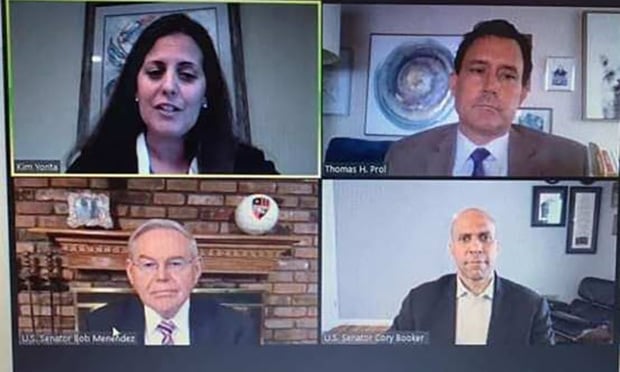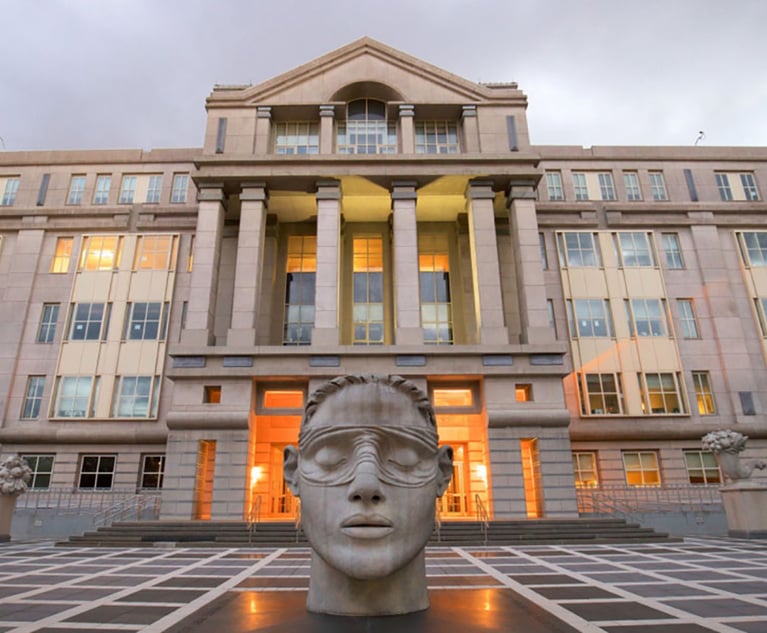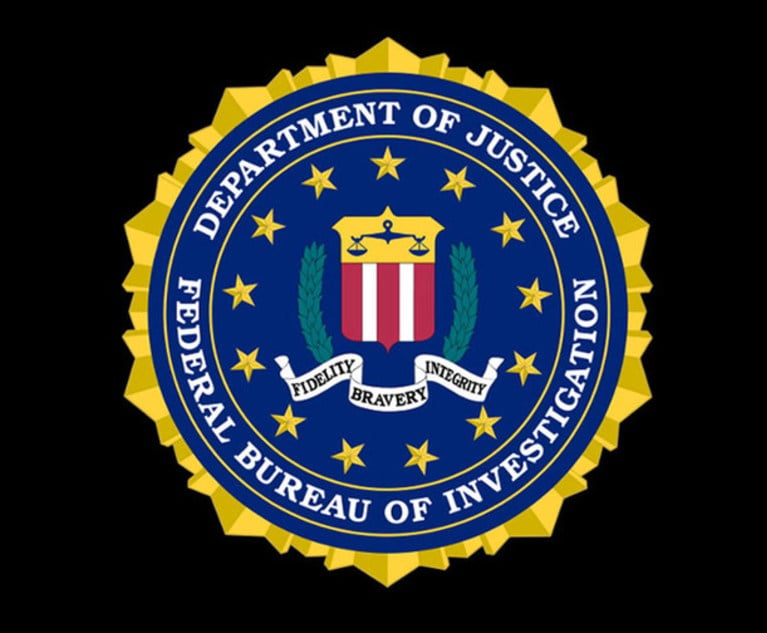Menendez, Booker Talk COVID-19 and the 'Struggles of Many Law Firms'
"Part of our ethics as lawyers is to do pro bono work," added Sen. Cory Booker. "I challenge you to raise our level of service during this crisis. This is a time for all hands on deck."
May 28, 2020 at 11:53 AM
7 minute read
 Clockwise from top left: NJSBA President Kim Yonta, former NJSBA President Tom Prol, U.S. Sens. Cory Booker and Bob Menendez on a COVID-19 Response, Relief and Steps Ahead virtual Q&A on May 27.
Clockwise from top left: NJSBA President Kim Yonta, former NJSBA President Tom Prol, U.S. Sens. Cory Booker and Bob Menendez on a COVID-19 Response, Relief and Steps Ahead virtual Q&A on May 27.
New Jersey's two U.S. senators addressed members of the State Bar Association on Wednesday via Zoom to discuss the state's response to COVID-19 and the challenges ahead.
Robert Menendez and Cory Booker both have law degrees: Menendez from Rutgers Law-Newark, class of 1979, and Booker from Yale Law, class of 1997. They said their priority when returning from a weeklong recess to Washington in early June is to refine the Paycheck Protection Program to better serve small business owners, push to get federal judicial vacancies filled, and draw attention to what they call unacceptable conditions in immigration courts, such as those in Newark and Elizabeth, that are ill-equipped for the pandemic.
There's also a bill that seeks up to $500 billion in aid for states and municipalities to deal with the COVID-19 fallout, which include crippling revenue losses, in order to stave off potential mass layoffs of public employees.
New Jersey Gov. Phil Murphy, hitting the political talk show circuit recently, predicted that if federal aid does not come through, thousands of teachers, police officers and firefighters, among others, could be seeing pink slips.
"Gov. Murphy has both of us on speed dial," said Menendez, who claimed he's been through it all as the state's senior senator: the Sept. 11, 2001, terrorist attacks, the financial collapse of 2008, and Superstorm Sandy in October 2012. But the impacts of those don't compare to the novel coronavirus and the current national crisis, he said.
Booker, Newark's former mayor who gained fame in 2012 for running into a burning city building to rescue a woman, on Wednesday described the pandemic as "one of our great life moments" and urged NJSBA members to step up and "do something versus doing nothing" to help others.
"Part of our ethics as lawyers is to do pro bono work," said Booker, who's completing his first term as senator this year. "I challenge you to raise our level of service during this crisis. This is a time for all hands on deck."
Menendez, who had a small law practice in Union City before entering Congress in 1993, described being an attorney as "one of the noblest professions in our society."
"The judiciary has had to adjust to a new normal like everyone else," he said during the one-hour webcast hosted by the NJSBA and moderated by Sills Cummis & Gross partner Thomas Prol, a former bar association president.
"I recognize the struggles of many law firms during the pandemic," Menendez added. "They themselves are small businesses."
According to the NJSBA, approximately 75% of New Jersey's licensed attorneys are in solo practices or small firms (defined as having five or fewer lawyers), and they may qualify for a PPP loan. The PPP, one of the measures implemented under the federal CARES Act, is designed to incentivize small businesses to keep their workers on the payroll, and assist with rent and other expenses throughout the pandemic.
But the PPP was "rife with problems from the beginning," said Menendez. "Funding dried up too quickly. Small businesses were left out, while big businesses gamed the system."
Menendez said as part of an agreement with the Trump administration to adjust the PPP, he secured an additional $60 billion for small lenders, community deposit institutions and minority-based financial institutions. He's working on further PPP reforms to allow businesses to use more of their PPP funding on expenses beyond payroll, such as utility and rent; extending the two-year time frame to repay the loans; and adding 501(c)(6) organizations into the mix of applicants.
"Because I realize it will take more time for small businesses to recover, I want to give them more flexibility on the time frame to spend on the PPP loans and still qualify for forgiveness," said Menendez, who sits on the Senate Banking, Housing, and Urban Affairs Committee and Senate Finance Committee.
At the beginning of the panel, the two Democratic senators were introduced by newly installed NJSBA President Kimberly Yonta, who took over on May 15.
Turning to the issue of immigration court, Menendez said, "Anything having to do with immigration has been especially hard."
Because of COVID-19, Elizabeth Immigration Court closed on March 24 for one day, closed again from March 30 to April 3, and then closed a third time on April 8 for one day before reopening, according to the Executive Office for Immigration Review, which falls under jurisdiction of the U.S. Department of Justice.
"They're not taking the pandemic seriously as a risk for infection," Menendez said of the DOJ's quick reopening of the Elizabeth court. "Operating in this pandemic is not business as usual."
Menendez said the state's immigration courts, which are controlled by the DOJ, are not conducive to social distancing, with cramped quarters and poor ventilation systems, and called for an executive review of their operations.
"We are pressing really hard on this with the [Trump] administration," Menendez said.
In response, Kathryn Mattingly, spokeswoman for the EOIR-DOJ, said the EOIR has postponed all non-detained hearings scheduled through June 12 and is continuing to receive and adjudicate filings, including emergency requests for stays of removal, and to hold hearings for detained aliens, including bond hearings, while monitoring and minimizing risks presented by the COVID-19 pandemic.
"The Executive Office for Immigration Review (EOIR) is actively and aggressively working to monitor and mitigate risks presented by the COVID-19 pandemic within EOIR space," Mattingly said in an email on Friday. "As with any type of emergency situation, EOIR is continuously assessing how to best ensure the safety of staff, attorneys, respondents, and visitors. EOIR takes the safety, health, and well-being of its employees very seriously and continues to closely review and implement guidance … in responding to issues concerning specific locations or employee situations related to the COVID-19 pandemic."
Booker, a member of the Senate Judiciary Committee, said judicial appointments have become highly politicized, with leaders "trampling on traditional ways" in vetting nominees.
There are currently 77 vacancies in the federal courts, 74 of them at the District Court level, according to the NJSBA. There are currently six vacancies in New Jersey, which has a total of 17 district court seats.
Asked by Prol if there was a timeline to fill the New Jersey vacancies, Booker said he and Menendez weren't being kept in the loop by the Trump administration.
A lifetime judicial appointment requires 60 votes in the Senate.
"The process has not been collaborative," said Booker. "They are not treating us as partners. A lot of tradition is being trampled over."
According to reports, Trump has appointed a high number of judges during his time in office compared with other presidents.
"The judiciary used to be the least polarized branch of government," added Booker. "Now it's the most politicized."
This content has been archived. It is available through our partners, LexisNexis® and Bloomberg Law.
To view this content, please continue to their sites.
Not a Lexis Subscriber?
Subscribe Now
Not a Bloomberg Law Subscriber?
Subscribe Now
NOT FOR REPRINT
© 2025 ALM Global, LLC, All Rights Reserved. Request academic re-use from www.copyright.com. All other uses, submit a request to [email protected]. For more information visit Asset & Logo Licensing.
You Might Like
View All
'Younger and Invigorated Bench': Biden's Legacy in New Jersey Federal Court
5 minute read
3rd Circuit Strikes Down NLRB’s Monetary Remedies for Fired Starbucks Workers


As Trafficking, Hate Crimes Rise in NJ, State's Federal Delegation Must Weigh in On New UN Proposal
4 minute readLaw Firms Mentioned
Trending Stories
- 1SDNY Criminal Division Deputy Chief Returns to Debevoise
- 2Brownstein Adds Former Interior Secretary, Offering 'Strategic Counsel' During New Trump Term
- 3Tragedy on I-95: Florida Lawsuit Against Horizon Freight System Could Set New Precedent in Crash Cases
- 4Weil, Loading Up on More Regulatory Talent, Adds SEC Asset Management Co-Chief
- 5Big Banks Did Great Last Year. What Does That Mean for Big Law?
Who Got The Work
J. Brugh Lower of Gibbons has entered an appearance for industrial equipment supplier Devco Corporation in a pending trademark infringement lawsuit. The suit, accusing the defendant of selling knock-off Graco products, was filed Dec. 18 in New Jersey District Court by Rivkin Radler on behalf of Graco Inc. and Graco Minnesota. The case, assigned to U.S. District Judge Zahid N. Quraishi, is 3:24-cv-11294, Graco Inc. et al v. Devco Corporation.
Who Got The Work
Rebecca Maller-Stein and Kent A. Yalowitz of Arnold & Porter Kaye Scholer have entered their appearances for Hanaco Venture Capital and its executives, Lior Prosor and David Frankel, in a pending securities lawsuit. The action, filed on Dec. 24 in New York Southern District Court by Zell, Aron & Co. on behalf of Goldeneye Advisors, accuses the defendants of negligently and fraudulently managing the plaintiff's $1 million investment. The case, assigned to U.S. District Judge Vernon S. Broderick, is 1:24-cv-09918, Goldeneye Advisors, LLC v. Hanaco Venture Capital, Ltd. et al.
Who Got The Work
Attorneys from A&O Shearman has stepped in as defense counsel for Toronto-Dominion Bank and other defendants in a pending securities class action. The suit, filed Dec. 11 in New York Southern District Court by Bleichmar Fonti & Auld, accuses the defendants of concealing the bank's 'pervasive' deficiencies in regards to its compliance with the Bank Secrecy Act and the quality of its anti-money laundering controls. The case, assigned to U.S. District Judge Arun Subramanian, is 1:24-cv-09445, Gonzalez v. The Toronto-Dominion Bank et al.
Who Got The Work
Crown Castle International, a Pennsylvania company providing shared communications infrastructure, has turned to Luke D. Wolf of Gordon Rees Scully Mansukhani to fend off a pending breach-of-contract lawsuit. The court action, filed Nov. 25 in Michigan Eastern District Court by Hooper Hathaway PC on behalf of The Town Residences LLC, accuses Crown Castle of failing to transfer approximately $30,000 in utility payments from T-Mobile in breach of a roof-top lease and assignment agreement. The case, assigned to U.S. District Judge Susan K. Declercq, is 2:24-cv-13131, The Town Residences LLC v. T-Mobile US, Inc. et al.
Who Got The Work
Wilfred P. Coronato and Daniel M. Schwartz of McCarter & English have stepped in as defense counsel to Electrolux Home Products Inc. in a pending product liability lawsuit. The court action, filed Nov. 26 in New York Eastern District Court by Poulos Lopiccolo PC and Nagel Rice LLP on behalf of David Stern, alleges that the defendant's refrigerators’ drawers and shelving repeatedly break and fall apart within months after purchase. The case, assigned to U.S. District Judge Joan M. Azrack, is 2:24-cv-08204, Stern v. Electrolux Home Products, Inc.
Featured Firms
Law Offices of Gary Martin Hays & Associates, P.C.
(470) 294-1674
Law Offices of Mark E. Salomone
(857) 444-6468
Smith & Hassler
(713) 739-1250






